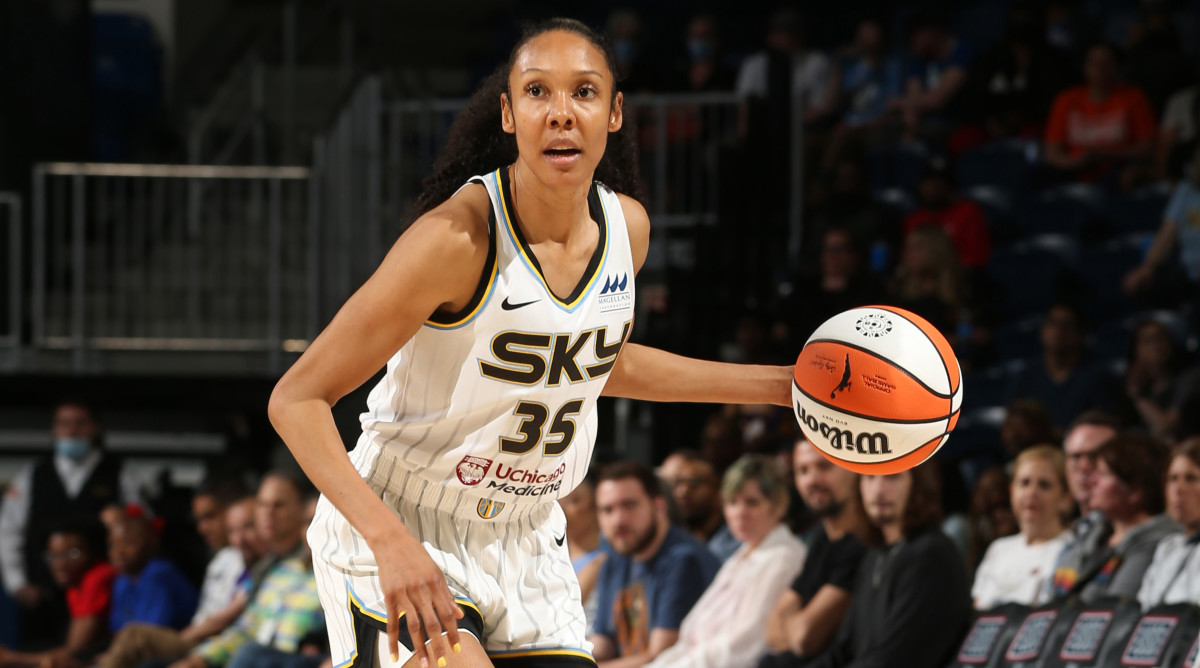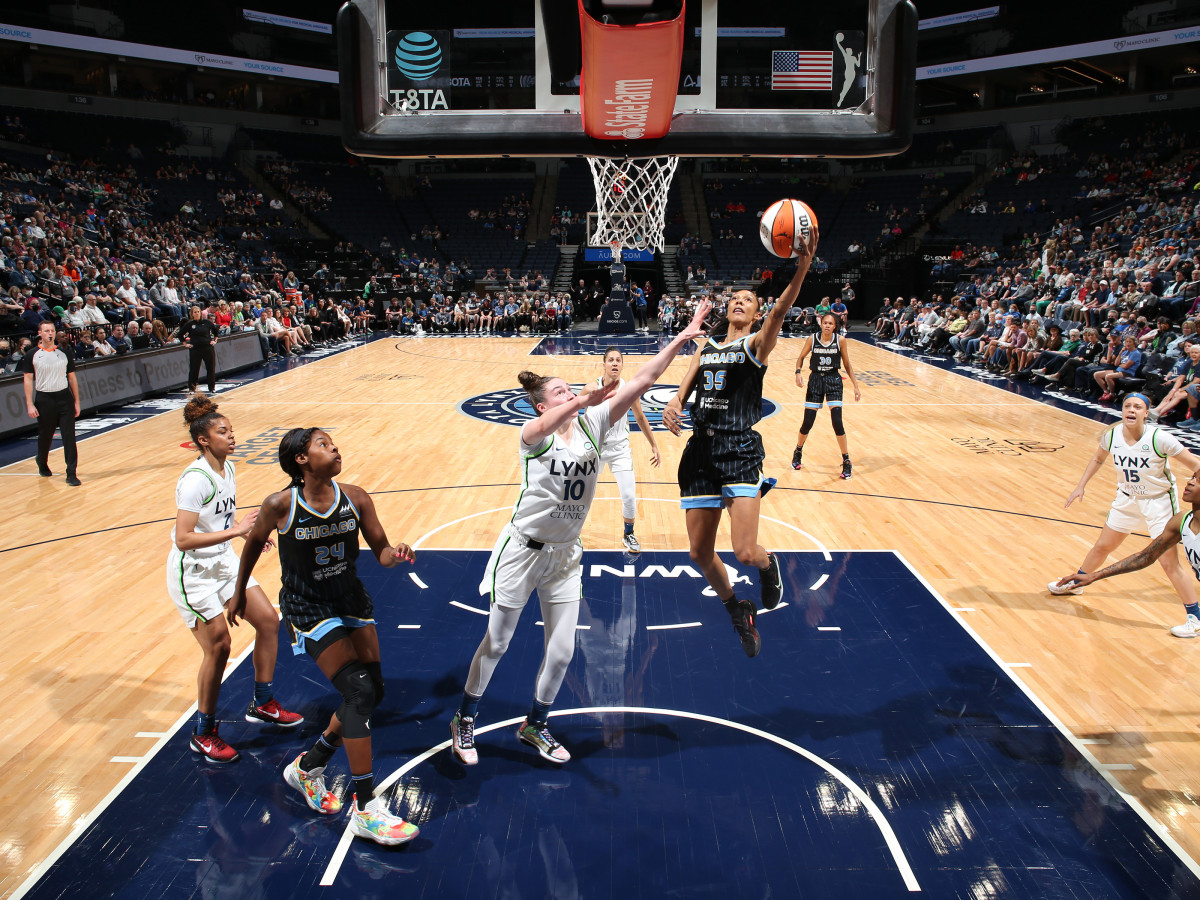The Rise of the Aging Rookie: Meet the WNBA’s Veteran Debutants
Rebekah Gardner had been in the United States for just four days when she was inserted into the Sky’s starting lineup last Wednesday against the Liberty. The 6'1" guard had recently wrapped up her overseas season with Uni Girona in Spain, missing all of Chicago’s training camp and logging just two practices with the reigning WNBA champions before suiting up against New York.
The abrupt turnaround is why on the morning of the Sky’s eventual 83–50 victory, Gardner told coach/general manager James Wade she was surprised by his decision to have her open the game. But despite her admission, the rookie guard also felt ready for her first WNBA contest, because … well … she isn’t exactly a traditional rookie, either.
Gardner has been playing professional basketball for a decade, having competed in Israel, Turkey, Romania and Spain since finishing her collegiate career at UCLA in 2012. According to Across the Timeline, at 31 years old, Gardner was the oldest rookie to start in her WNBA debut since ’03. “That definitely means a lot,” she says. “It’s hard to explain in words.”

She is not alone in being a veteran of professional basketball but a newcomer in the W. So far this season, according to Across the Timeline, there have been seven debutants who are at least 26 years old, the most since 2001. Three of them—Gardner, teammate forward Tina Krajisnik and Connecticut guard Yvonne Anderson—are in their early 30s.
“We have the talent and now we’re finally getting our opportunity,” says Anderson, who turned 32 in March. “You just want people to root for us with the same vigor they root for younger players. We all want to play at the highest level.”
Anderson, like Gardner, has carved out a successful career as a basketball nomad. The daughter of St. John’s men’s basketball coach Mike Anderson, she admits she was a little spoiled by the resources provided by the University of Texas, where she played four seasons. A prime example came after graduation when Anderson moved to Sweden. While there, she remembers relying on a bicycle to get around, recalling one particular instance when she was riding to a grocery store but face-planted trying to make a left turn during a snowfall. “I guess I could have been smarter not riding the bike in the snow,” she says. “But it’s not something that I was used to.” The sport has subsequently also taken her to Australia, Luxembourg, Greece, Turkey and, most recently, Italy.
Anderson is also a naturalized citizen of Serbia, having played a key role on the team’s fourth-place finish at the Tokyo Olympics. Such experiences not only helped her game develop and raised her profile with WNBA front offices, but also introduced her to many of the WNBA’s top talent, as a large swath of players go abroad when the WNBA season concludes. (Roughly half the league’s athletes played overseas in 2022.)
“I knew I could play basketball at a really high level,” says Anderson, who played 13 minutes in her debut vs. the Sparks on Saturday. “And what my journey taught me is I just had more time to get better by working, more time to learn myself and to grow. That’s why I’m here, why at 32 I’m getting the opportunity now.”
It’s notoriously hard for WNBA draft picks to make a team weeks after their selection, largely due to either roster or salary limitations. According to NBC Sports, heading into this year an average of 13 newly drafted rookies were waived before the first game of the WNBA season. Seventeen of 36 selections from the 2022 draft made opening-day rosters.
Sun coach/general manager Curt Miller says that players with more experienced overseas often, in part, struggle to make WNBA teams due to international seasons conflicting with training camps. But the added poise and steadiness gained by those reps also attribute to older rookies making an impact Stateside if, and when, they get the chance. Mystics guard Rui Machida is a 29-year-old Japanese star who led her home nation to an Olympic silver medal behind her skillful passing ability. Thus far, she’s made two starts and averaged 22.4 minutes per contest. Gardner scored 14 points in her WNBA debut and added 10 points in a team-high 28 minutes off the bench three nights later against the Lynx. That same night, 28-year-old Minnesota forward Nina Milic finished with a game-high 18 points against Chicago, having quickly emerged as a viable frontcourt option. She’s done so after averaging 17.6 points and 6.7 rebounds per game in Hungarian play this winter, the latest successful season in a multiyear career.
“She plays like a vet because she is a vet,” Minnesota coach/general manager Cheryl Reeve said of Milic after the loss. “Just first year in the W.”
Of course, for players who grew up playing overseas, there are some adjustments to be made in the WNBA. For instance, Krajisnik, the 31-year-old Sky forward, says she’s had to pick up on various rule differences, like the fact that FIBA does not employ defensive three seconds but the WNBA does. She adds that W games are also more physical and played at a faster pace.
When U.S. players go overseas, Krajisnik says she tries to help them adjust, whether it is on or off court. Players like Aces star Kelsey Plum, who Krajisnik played with in Turkey this past offseason, have now returned the favor.
“I had some type of idea for what I was expecting here,” she says. “[But] I like to ask [questions]. For me to get advice at this age is also wise.”
Anderson has vacillated between getting advice and giving it. She says she has helped fellow rookie Nia Clouden, the team’s first-round pick out of Michigan State, read the floor more like a veteran. But Anderson has still sought out feedback related to the Sun’s basic principles.
Gardner can relate. She says longtime Chicago guard Courtney Vandersloot has helped her understand the team’s system and about what it takes to be successful with the organization. Gardner’s done less teaching herself, though, because of her late arrival. (As of this weekend, she hadn’t fully unpacked her belongings. Her mind, she says, “has been going at like 1,000 miles per hour,” while she adjusts.)

Both Gardner and Anderson were part of Chicago’s training camp in 2017. Neither made the roster or had been part of a WNBA preseason since. This spring, though, as both have made their debuts, they’ve communicated regularly and voiced how happy they are to see each other’s successes. Anderson has also done the same with Krajisnik as the two were teammates on the Serbian national team.
Gardner says her passion for the sport has kept her going, even while opportunities in the U.S. failed to come her way. She describes her tenure with the Sky as “like the cherry on top” of her career. “It’s about being at the right place, at the right time and being ready for the moment,” she adds.
Anderson agrees with the aforementioned sentiment, and feels grateful for her long-awaited chance to play in the WNBA. She’s also appreciative, though, of another part of her rookie experience.
“Luckily, I haven’t [been hazed],” she says. “I’m surprised. They’ve been pretty cool about it, but it would be weird trying to haze the third-oldest player on the team.”
More WNBA Coverage:
• On-Court Courting: How These WNBA Couples Came to Be
• How Russia Pushed the WNBA to a Crossroads
• The WNBA’s Dream Are Rising
